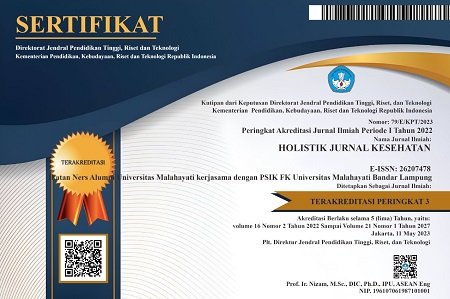Dukungan keluarga dan kualitas hidup pada pasien dengan Skizofrenia
Abstract
Background: Based on data World Health Organization (WHO) in 2022 schizophrenia is a severe mental disorder that affects about 7 per thousand of the adult population, especially in the age group 15-35 years. Although the incidence is low (3-10,000), a high prevalence is due to chronicity. Based on data obtained from the Lampung Provincial Mental Hospital in 2021, 27,490 outpatient visits were recorded, 2,606 were new patients and 24,884 were old patients, of which 17,924 were male and 9,566 were female.
Purpose: To identify the relationship between family support and quality of life among patients with schizophrenia.
Method: This type of research uses quantitative, the research design uses an analytical survey with a cross-sectional approach, the population and sample in this study were outpatient patients at the Lampung Provincial Mental Hospital, accidental sampling technique, univariate and bivariate data analysis using chi square. The research will be conducted at the Regional Mental Hospital of Lampung Province in February 2022.
Results: Most of the family support is a poor category as many as 29 respondents (58.0%). Most quality of life among patients with schizophrenia is a poor category as many as 29 respondents (58.0%).
Conclusion: There is a relationship between family support and quality of life in schizophrenic patients at the Lampung Provincial Mental Hospital in 2022 with a p-value = 0.000 (< 0.05)
Keywords: Family Support; Quality of Life; Patients; Schizophrenia
Pendahuluan: Skizofrenia merupakan gangguan mental yang berat yang mempengaruhi sekitar 7 per seribu dari populasi orang dewasa, terutama di kelompok usia 15-35 tahun. Meskipun insiden rendah (3-10.000), prevalensi yang tinggi terjadi karena kronisitas. Berdasarkan data yang diperoleh dari Rumah Sakit Jiwa Provinsi Lampung tahun 2021 tercatat 27.490 kunjungan pasien jiwa yang rawat jalan, 2.606 merupakan pasien baru dan 24.884 merupakan pasien lama, dimana 17.924 laki dan 9.566 perempuan, dari data 24.884 pasien lama terdapat 19.907 pasien mengalami kekambuhan.
Tujuan: Diketahui hubungan antara dukungan keluarga dengan kualitas hidup pada pasien skizofrenia
Metode: Jenis penelitian menggunakan kuantitatif, rancangan penelitian menggunakan survey analitik dengan pendekatan cross sectional, populasi dan sampel dalam penelitian ini adalah pasien melakukan rawat jalan di Rumah Sakit Jiwa Daerah Provinsi Lampung, teknik sampling accidental , analisa data univariat dan bivariat menggunakan chi square. Penelitian akan dilakukan di Rumah Sakit Jiwa Daerah Provinsi Lampung pada bulan Februari 2022.
Hasil : Sebagian besar dukungan keluarga kategori buruk sebanyak 29 responden (58,0%). Sebagian besar kualitas hidup pasien skizofrenia kategori buruk sebanyak 29 responden (58,0%).
Simpulan: Ada hubungan antara dukungan keluarga dengan kualitas hidup pada pasien skizofrenia di rumah sakit jiwa daerah provinsi Lampung tahun 2022 dengan nilai p-value = 0,000 (< α 0,05)
Keywords
References
Afconneri, Y., & Puspita, W. G. (2020). Faktor-Faktor Kualitas Hidup Pasien Skizofrenia. Jurnal Keperawatan Jiwa, 8(3), 273-278.
Damayanti, F. P. (2020). Hubungan Antara Dukungan Keluarga Dengan Kekambuhan Pada Pasien Skizofrenia Di Wilayah Kerja Puskesmas Geger Kabupaten Madiun (Doctoral dissertation, Stikes Bhakti Husada Mulia Madiun).
Erawati, E., Keliat, B. A., & Daulima, N. H. (2014). The validation of the Indonesian version of psychotic symptoms ratings scale (PSYRATS), the Indonesian version of cognitive bias questionnaire for psychosis (CBQP) and metacognitive ability questionnaire (MAQ). International Journal of Advanced Nursing Studies, 3(2), 97.
Haddock, G., McCarron, J., Tarrier, N., & Faragher, E. B. (1999). Scales to measure dimensions of hallucinations and delusions: the psychotic symptom rating scales (PSYRATS). Psychological medicine, 29(4), 879-889.
Michael, Y. L., Berkman, L. F., Colditz, G. A., Holmes, M. D., & Kawachi, I. (2002). Social networks and health-related quality of life in breast cancer survivors: a prospective study. Journal of Psychosomatic research, 52(5), 285-293.
O'Brien, P., Kennedy, W. Z., & Ballard, K. A. (2013). Psychiatric mental health nursing: An introduction to theory and practice. Jones & Bartlett Publishers.
Prabowo, E. (2014). Konsep & aplikasi asuhan keperawatan jiwa. Yogyakarta: Nuha Medika.
Pratiwi, D. A., & Warsiti, W. (2014). Hubungan Dukungan Keluarga dengan Tingkat Depresi Pasien Gagal Ginjal Kronik dengan Hemodialisis di RS PKU Muhammadiyah Yogyakarta (Doctoral dissertation, STIKES'Aisyiyah Yogyakarta).
Pribadi, T., Lin, E. C. L., Chen, P. S., Lee, S. K., Fitryasari, R., & Chen, C. H. (2020). Factors associated with internalized stigma for Indonesian individuals diagnosed with schizophrenia in a community setting. Journal of Psychiatric and Mental Health Nursing, 27(5), 584-594.
Rahayuningrum, D. C., Nofia, V. R., & Dewi, R. I. S. (2021). Hubungan dukungan keluarga dengan kualitas hidup pasien skizofrenia. Jurnal Kesehatan Medika Saintika, 12(1), 144-151.
Ridho, R. H. (2019). Peningkatan Dukungan Keluarga dalam Menentukan Studi Lanjut Siswa. Jurnal Education and Economics, 2(02), 230-236.
Wardani, I. Y., & Dewi, F. A. (2018). Kualitas hidup pasien skizofrenia dipersepsikan melalui stigma diri. Jurnal Keperawatan Indonesia, 21(1), 17-26.
Yosep, I. (2011). Keperawatan Jiwa, Edisi 4. Jakarta : Refika Aditama.
Yudhistira, Y. (2016). Hubungan fungsi sosial dengan kualitas hidup pasien skizofrenia (Doctoral dissertation, Universitas Muhammadiyah Yogyakarta).
Yunitasari, I. (2018). Hubungan Dukungan Keluarga dan Self-Efficacy dengan Upaya Pencegahan Relapse pada Penyalahguna Napza Pasca Rehabilitasi di Badan Narkotika Nasional Provinsi Kalimantan Timur. Psikoborneo, 6(2), 420-434.
DOI: https://doi.org/10.33024/hjk.v17i4.9190
Refbacks
- There are currently no refbacks.
Copyright (c) 2023 Holistik Jurnal Kesehatan

This work is licensed under a Creative Commons Attribution-NonCommercial 4.0 International License.














